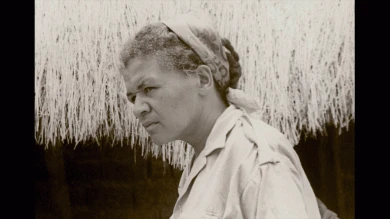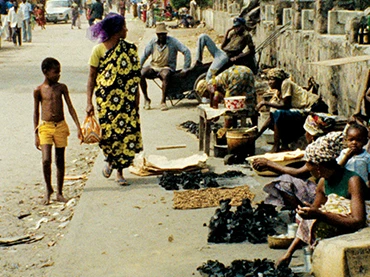-
Saturday, 11 May 2019 - 7pm
Session 1. The Wretched of the Earth I: The Anti-Colonial Revolt
Matadero Cinematheque, Azcona Theatre
Sarah Maldoror
Monangambée
Algeria, 1969, b&w, original version in French with Spanish subtitles, 16mm transferred to digital, 17’Sambizanga
Angola and France, 1972–1973, colour, original version in Portuguese, Lingala and Mbundu with Spanish subtitles, 16mm transferred to digital, 102’Presented by: Sarah Maldoror
Two of the film-maker’s landmark films are screened in this session: Firstly, Monangambée, a chant meaning “white death” and a customary war cry against colonial exploitation in Angola. This short film describes the culturally incomprehensible abuses of Portuguese civil servants in the African country after the torture of a prisoner. Secondly, Sambizanga, a fictional feature-length film on the arrest of a member of the Movement of the Liberation of Angola and his wife and son’s relentless search for him. The film offers a feminist view against bureaucracy and the brutality of colonialism.
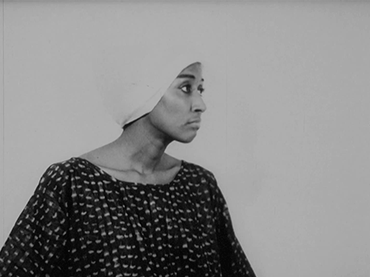
-
Sunday, 12 May 2019 - 7pm
Session 2. The Wretched of the Earth II: The Anti-Colonial Revolt
Sabatini Building, Auditorium
Gillo Pontecorvo (assistant director: Sarah Maldoror)
La battaglia di Algeri (The Battle of Algiers)
Algeria and Italy, 1965, b/w, original version in French and Arabic with Spanish subtitles, B-R, 121’Presented by: Annouchka de Andrade and Olivier Hadouchi
One of the most influential political films ever made, The Battle of Algiers vividly recreates Algeria’s turbulent struggle for liberation from French rule in the 1950s. Filmed documentary style on the streets of Algiers, the film constitutes a study of contemporary war, with terrorist attacks carried out by civilians and the brutal military techniques used to combat them. In this tour de force, Sarah Maldoror worked with Pontecorvo as assistant director.
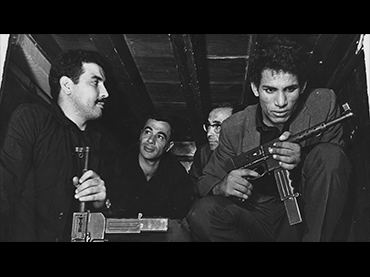
-
Monday, 13 May 2019 - 7pm
Session 3. The Wretched of the Earth III: The Anti-Colonial Revolt
Sabatini Building, Auditorium
Mathieu Klebeye Abonnenc
Préface à des fusils pour Banta
French Guyana, 2011, colour, original version in French with Spanish subtitles, digital archive, 28’Round-table discussion between Annouchka de Andrade, Olivier Hadouchi and Mathieu Klebeye Abonnenc, moderated by Chema González
A film installation on Sarah Maldoror’s lost film, Des fussils pour Banta, her first feature which was deemed too ambiguous by Algeria’s revolutionary government and therefore seized. The round-table discussion following the screening seeks at once to place Sarah Maldoror in the context of Third Cinema and to study her role in a present that is battling against new forms of colonialism, as well as the poetic and political lessons that issue forth from her films and life.
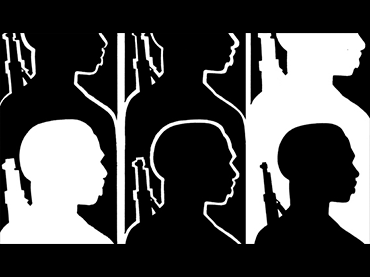
-
Tuesday, 14 May 2019 - 9:30pm
Session 4. Land and Carnival I
Matadero Cinematheque, Borau Theatre
William Klein (assistant director: Sarah Maldoror)
Festival panafricain d'Alger [The Pan-African Festival of Algiers] RFA, Algeria and France, 1970, colour, original version in French and English with Spanish subtitles, digital archive, 90’“African culture will be revolutionary, or it won’t be”, concludes this monumental fresco on Pan-Africanism as the thinking of emancipation. To the vibrant rhythm of black music by Miriam Makeba, Archie Shepp, Nina Simone and Marion Williams, the architects of new black culture appear in the film alongside the major theorists of decolonialisation and future national leaders, while texts on the screen pick apart the colonialist system and its machinery of oppression.
![William Klein. Festival panafricain d'Alger [The Pan-African Festival of Algiers]. Film, 1970 William Klein. Festival panafricain d'Alger [The Pan-African Festival of Algiers]. Film, 1970](https://recursos.museoreinasofia.es/legacy_programs/maldoror-4.gif)
-
Wednesday, 15 May 2019 - 7pm
Session 5. Land and Carnival II
Matadero Cinematheque, Borau Theatre
Sarah Maldoror
A Bissau, le carnaval
Guinea-Bissau, 1980, colour, original version in French with Spanish subtitles, digital archive, 18’Fogo, l´ile de feu
Cape Verde, 1979, colour, original version in Portuguese and French with Spanish subtitles, digital archive, 32’Un carnaval dans le Sahel
Cape Verde, 1979, colour, original version in Portuguese with Spanish subtitles, digital archive, 15’Following her experience with guerrillas and international decolonial movements, Sarah Maldoror directed a film season on new nations at the request of the governments of Guinea-Bissau and Cabo Verde. As an approach to the history of colonisation and black culture, she uses carnival, understood as a festival with which to breach limits, whereby the dominator becomes the dominated. Concurrently, carnival bursts with music and impressions, a great collective performance engendering the identity qualities of Négritude.
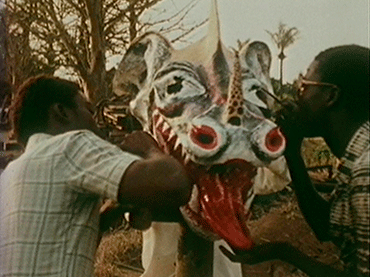
-
Thursday, 16 May 2019 - 7pm
Session 6. Poetry: Aimé Cesaire
Sabatini Building, Auditorium
Sarah Maldoror
Et les chiens se taiseient, d'Aimé Césaire
France, 1978, colour, original version in French with Spanish subtitles, digital archive, 13’Aimé Césaire au bout du petit matin
France, 1977, colour, original version in French with Spanish subtitles, digital archive, 57’This session focuses on the poet, intellectual, dramaturgist and politician Aimé Cesaire (1913–2008), author of Discourse on Colonialism (1950) and several pivotal poem collections on Négritude. In Et les chiens se taiseient (1946), Maldoror adapts a theatre piece on a rebel who, condemned to death, becomes aware of his otherness. The dialogue with his mother – both existentialist and autobiographical – reverberates around the African sculptures on display at the Museum of Man, the old Trocadéro and an institution representing French colonial plundering, and is filmed through the mediation of Surrealist anthropologist Michel Leiris. Aimé Césaire au bout du petit matin tacks, on the landscape of Martinica, poetry readings, interviews with the writer and filmed theatre in a synthesis representing, through visual metaphors, the qualities of Césaire’s writing; “beautiful as nascent oxygen”, as André Breton wrote.
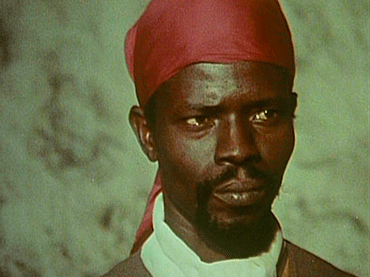
-
Friday, 17 May 2019 - 7pm
Session 7. Poetry: Two Worlds, Two Poets
Sabatini Building, Auditorium
Sarah Maldoror
Louis Aragon, un masque à Paris
France, 1978, colour, original version in French with Spanish subtitles, digital archive, 20’Léon G. Damas
France, 1994, colour, original version in French with Spanish subtitles, digital archive, 26’This session brings together the last Surrealist poet in the inter-war period and the first in the new Surrealism of Négritude seen by Sarah Maldoror. Louis Aragon (1897–1982) is depicted with a red mask before his imagined museum, a huge archive of portraits, photographs and books, amassed in a disappearing world. Leon G. Damas (1912–1978), meanwhile, was the first poet to “live Négritude”, according to Leopold Senghor. Cosmopolitan and always in transit, his writing is a chorus of melodies and images imbued with angst and melancholy, and strongly influenced by jazz, blues and black music. This film, shot to the landscapes of Guyana with the voice of the artist, emerges from Maldoror’s keenness to create a poetic documentary.
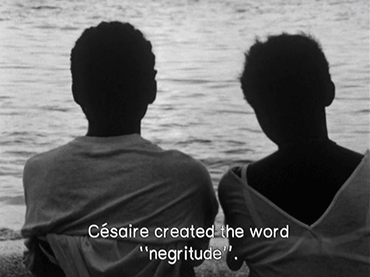
-
Saturday, 18 May 2019 - 7pm
Session 8. The Women
Sabatini Building, Auditorium
Ahmed Lallem (assistant director: Sarah Maldoror)
The Women
Algeria and France, 1966, colour, original version in French and Arabic with Spanish subtitles, 35mm, 22’Sarah Maldoror
Toto Bissainthe
Haiti, 1984, colour, original version in French with Spanish subtitles, digital archive, 4’Ana Mercedes Hoyos
France and Colombia, 2009, colour, Spanish, digital archive, 13’In these female portraits the double subordinate condition of race and gender in the women portrayed can be perceived, not to mention their irrepressible energy. From the first to the last, Maldoror’s films meld anti-racism and a reflection on the place women occupy in the new decolonial society. This is the case in the medium-length film The Women, in which Ahmed Lallem, assisted by Maldoror, represents the aspirations of a group of young women after the independence of Algeria. Toto Bissainthe is a biographical sketch of the renowned Haitian singer and original member of Les griots, Sarah Maldoror’s theatre company of black actors, while Ana Mercedes Hoyos describes the career of the Colombian artist from the Atlantic side of Négritude and the traces of black culture in Colombia.
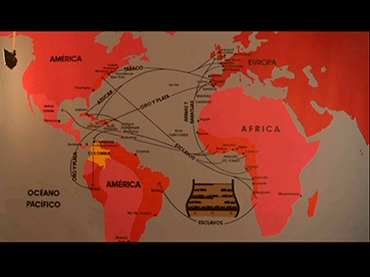
-
Sunday, 19 May 2019 - 7pm
Session 9. Paris Jazz: Anti-Racist Film in the Mainstream
Sabatini Building, Auditorium
Sarah Maldoror
Un dessert pour Constance
France, 1980, colour, original version in French with Spanish subtitles, digital archive, 60’Scala Milan A.C.
France, 2003, colour, original version in French with Spanish subtitles, digital archive, 18’Les oiseaux mains
France, 2005, colour, original version in French with Spanish subtitles, digital archive, 30’’Sarah Maldoror puts forward cinema that brings down identity stereotypes from the mainstream. These two films made for television come together to demonstrate the multi-culturalism of Parisian society, in spite of the predominant national culture: in the comedy Un dessert pour Constance, two street cleaners of African origin find a cookbook of classic French recipes, which they study for fun and become genuine experts, winning first prize in a typically middle class TV programme in France; in Scala Milan A.C., a group of suburban youths from different ethnic and geographical backgrounds decide to describe their neighbourhood to the rhythm of Archie Shepp’s jazz, shaping a poetic anthem to a racialised and invisible France. Finally, Les oiseaux mains is a brief animation on utopia in marginalisation, revealing the film-maker’s desire for continuous learning.
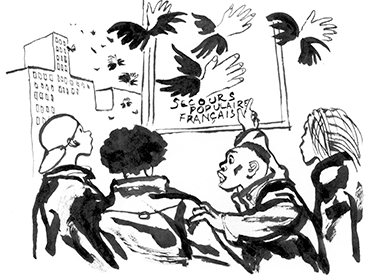
Sarah Maldoror, Négritude Poet and Film-maker
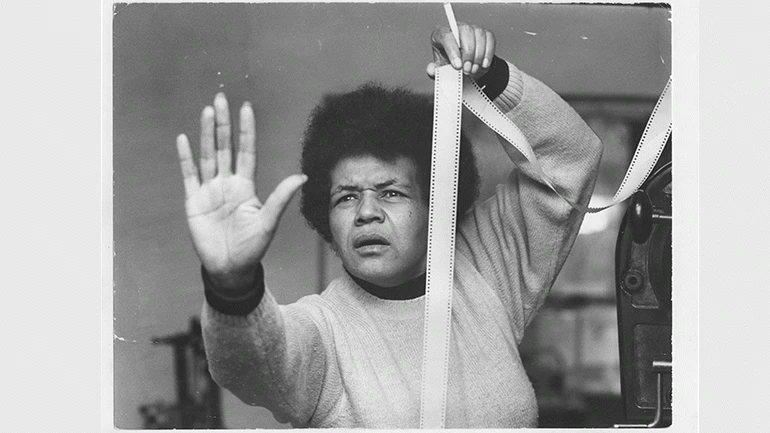
Held on 11, 18 May 2019
The first retrospective on Sarah Maldoror (Gers, France, 1929) in Spain rediscovers a vital film-maker whose work remains obscure, despite her huge commitment to the decolonial movement and the struggles for social diversity from 1960 onwards. Born Sarah Ducados to an Antillean father and a French mother, she took on the name Maldoror in homage to Les Chants de Maldoror (The Songs of Maldoror) by Lautréamont, a poet admired by the Surrealists. Such a gesture sought to breathe life into Surrealism from the tenets of Négritude, an artistic, social and political movement she would become a major exponent of, with her work responding at once to the search for poetic form with which to express an alternative identity and the promise of a future society offering new black culture emanating from anti-colonialism and Pan-Africanism during the 1960s.
In 1961 Maldoror went to Moscow to study film, and it was there that she met Ousmane Sembène, the great Senegalese film-maker, and began working on vibrant and syncopated montages to rhythms of jazz and black music. Upon her return to France she joined the struggles of the African emancipation movements, complementing her films with essays by Amílcar and Luis Cabral, Joaquim and Mário de Andrade. A condemnation of the colonialist system is at the core of her best-known films: Monangambée, Sambizanga and La battaglia di Algeri (The Battle of Algiers), in which she collaborated as assistant director to Gillo Pontecorvo.
The aforementioned films, shot in Algeria and the Congo at the height of anti-colonial uprisings, denounce the repression of people and the use of torture against guerrillas from an anti-racist and feminist perspective of emancipation, in keeping with the film-maker’s oeuvre. Despite a strong political commitment, her work eschewed propaganda, so much so that Algeria’s revolutionary government considered her first feature, Des fusils pour Banta, too ambiguous and seized it – the film has not seen the light of day until now. The thrilling prospect of a society without Western rule paved the way for a new line of work, in which African identity is explored through festivals and carnivals, leading to a collaboration with William Klein in the huge 1969 fresco Festival panafricain d'Alger (The Pan-African Festival of Algiers), showing the carnivals of Cape Verde and Guinea-Bissau.
In the wake of this militant period, Maldoror approached Négritude as a poetics of difference. Based on Pan-Africanism, anti-colonialism and the synthesis between Marxism and Surrealism, Négritude is a cultural movement founded by poets Aimé Cesaire (Martinica, 1913–2018), Leopold Senghor (Senegal, 1906–2001) and Leon G. Damas (France, 1912–1978). It had such a strong influence on Sarah Maldoror that her films would be defined as a translation of the three writers’ poetry into images and sound, a visual manifesto of Négritude manifested in the consideration of identity as the result of relations, the constant presence of orality, the poetic word, and the frenetic rhythm of sonorous music.
Curatorship
Chema González
Locations
Museo Nacional Centro de Arte Reina Sofía
Sabatini Building, Auditorium - Santa Isabel, 52
Matadero Madrid
Cinematheque, Azcona and Borau Theatres – Plaza de Legazpi, 8
With the support of
Acknowledgements
Embassy of Algeria in Spain, Cinematheque of Algeria, Ministère de l'Europe et des Affaires étrangères, Center national du cinéma et de l'image animée (CNC) and CNRS Images
Organised by
Museo Reina Sofía and DocumentaMadrid 2019 (16th International Documentary Film Festival)

Participants
Annouchka de Andrade is Sarah Maldoror’s daughter and one of the main figures behind the recovery of her work.
Mathieu Klebeye Abonnenc is an Antillean artist whose work approaches Sarah Maldoror’s and who looks to rebuild the affection and personal threads of the early decolonial movement.
Olivier Hadouchi is a researcher, professor and independent programmer who has worked tirelessly to recover militant and decolonial cinema from the 1960s and 1970s.
Chema González is head of the Museo Reina Sofía’s Cultural Activities and Audovisuals and the curator of this series.
Itinerancies
Buenos Aires, Argentina
22 September, 2020 - 29 September, 2020
Más actividades
![Tracey Rose, The Black Sun Black Star and Moon [La luna estrella negro y negro sol], 2014.](https://recursos.museoreinasofia.es/styles/small_landscape/public/Obra/AD07091_2.jpg.webp)
On Black Study: Towards a Black Poethics of Contamination
Monday 27, Tuesday 28 and Wednesday 29 of April, 2026 – 16:00 h
The seminar On Black Study: Towards a Black Poethics of Contamination proposes Black Study as a critical and methodological practice that has emerged in and against racial capitalism, colonial modernity and institutional capture. Framed through what the invited researcher and practitioner Ishy Pryce-Parchment terms a Black poethics of contamination, the seminar considers what it might mean to think Blackness (and therefore Black Study) as contagious, diffuse and spreadable matter. To do so, it enacts a constellation of diasporic methodologies and black aesthetic practices that harbor “contamination” -ideas that travel through texts, geographies, bodies and histories- as a method and as a condition.
If Blackness enters Western modernity from the position of the Middle Passage and its afterlives, it also names a condition from which alternative modes of being, knowing and relating are continually forged. From within this errant boundarylessness, Black creative-intellectual practice unfolds as what might be called a history of touches: transmissions, residues and socialities that unsettle the fantasy of pure or self-contained knowledge.
Situated within Black radical aesthetics, Black feminist theory and diasporic poetics, the seminar traces a genealogy of Black Study not as an object of analysis but as methodological propositions that continue to shape contemporary aesthetic and political life. Against mastery as the horizon of study, the group shifts attention from what we know to how we know. It foregrounds creative Black methodological practices—fahima ife’s anindex (via Fred Moten), Katherine McKittrick’s expansive use of the footnote, citation as relational and loving labour, the aesthetics of Black miscellanea, and Christina Sharpe’s practices of annotation—as procedures that disorganise dominant regimes of knowledge. In this sense, Black Study is approached not as a discrete academic field but as a feel for knowing and knowledge: a constellation of insurgent practices—reading, gathering, listening, annotating, refusing, world-making—that operate both within and beyond the university.
The study sessions propose to experiment with form in order to embrace how ‘black people have always used interdisciplinary methodologies to explain, explore, and story the world.’ Through engagements with thinkers and practitioners such as Katherine McKittrick, C.L.R. James, Sylvia Wynter, Christina Sharpe, Fred Moten, Tina Campt, Hilton Als, John Akomfrah, fahima ife and Dionne Brand, we ask: What might it mean to study together, incompletely and without recourse to individuation? How might aesthetic practice function as a poethical intervention in the ongoing work of what Sylvia Wynter calls the practice of doing humanness?

Intergenerationality
Thursday, 9 April 2026 – 5:30pm
This series is organised by equipoMotor, a group of teenagers, young people and older people who have participated in the Museo Reina Sofía’s previous community education projects, and is structured around four themed blocks that pivot on the monstrous.
The third session gazes at film as a place from which to dismantle the idea of one sole history and one sole time. From a decolonial and queer perspective, it explores films which break the straight line of past-present-future, which mix memories, slow progress and leave space for rhythms which customarily make no room for official accounts. Here the images open cracks through which bodies, voices and affects appear, disrupting archive and questioning who narrates, and from where and for whom. The proposal is at once simple and ambitious: use film to imagine other modes of remembering, belonging and projecting futures we have not yet been able to live.

Remedios Zafra
Thursday March 19, 2026 - 19:00 h
The José Luis Brea Chair, dedicated to reflecting on the image and the epistemology of visuality in contemporary culture, opens its program with an inaugural lecture by essayist and thinker Remedios Zafra.
“That the contemporary antifeminist upsurge is constructed as an anti-intellectual drive is no coincidence; the two feed into one another. To advance a reactionary discourse that defends inequality, it is necessary to challenge gender studies and gender-equality policies, but also to devalue the very foundations of knowledge in which these have been most intensely developed over recent decades—while also undermining their institutional support: universities, art and research centers, and academic culture.
Feminism has been deeply linked to the affirmation of the most committed humanist thought. Periods of enlightenment and moments of transition toward more just social forms—sustained by education—have been when feminist demands have emerged most strongly. Awareness and achievements in equality increase when education plays a leading social role; thus, devaluing intellectual work also contributes to harming feminism, and vice versa, insofar as the bond between knowledge and feminism is not only conceptual and historical, but also intimate and political.
Today, antifeminism is used globally as the symbolic adhesive of far-right movements, in parallel with the devaluation of forms of knowledge emerging from the university and from science—mistreated by hoaxes and disinformation on social networks and through the spectacularization of life mediated by screens. These are consequences bound up with the primacy of a scopic value that for some time has been denigrating thought and positioning what is most seen as what is most valuable within the normalized mediation of technology. This inertia coexists with techno-libertarian proclamations that reactivate a patriarchy that uses the resentment of many men as a seductive and cohesive force to preserve and inflame privileges in the new world as techno-scenario.
This lecture will address this epochal context, delving into the synchronicity of these upsurges through an additional parallel between forms of patriarchal domination and techno-labor domination. A parallel in which feminism and intellectual work are both being harmed, while also sending signals that in both lie emancipatory responses to today’s reactionary turns and the neutralization of critique. This consonance would also speak to how the perverse patriarchal basis that turns women into sustainers of their own subordination finds its equivalent in the encouraged self-exploitation of cultural workers; in the legitimation of affective capital and symbolic capital as sufficient forms of payment; in the blurring of boundaries between life and work and in domestic isolation; or in the pressure to please and comply as an extended patriarchal form—today linked to the feigned enthusiasm of precarious workers, but also to technological adulation. In response to possible resistance and intellectual action, patriarchy has associated feminists with a future foretold as unhappy for them, equating “thought and consciousness” with unhappiness—where these have in fact been (and continue to be) levers of autonomy and emancipation.”
— Remedios Zafra

ARCO2045. The Future, for Now
Saturday 7, March 2026 - 9:30pm
The future, its unstable and subjective nature, and its possible scenarios are the conceptual focus of ARCOmadrid 2026. A vision of the future linked to recent memory, a flash of insight into a double-edged sword. This year's edition, as in the previous two, will once again hold its closing party at the Reina Sofia Museum. This time, the star of the show is Carles Congost (Olot, Girona, 1970), one of the artists featured in the new presentation of the Collections recently inaugurated on the 4th floor of the Sabatini Building.
Carles Congost, with his ironic and timeless gaze, is responsible for setting the tone for this imperfect future, with a DJ session accompanied by some of his works in the Cloister on the first floor of the Sabatini Building of the Museo on the night of Saturday 7 March.

27th Contemporary Art Conservation Conference
Wednesday, 4, and Thursday, 5 March 2026
The 27th Contemporary Art Conservation Conference, organised by the Museo Reina Sofía’s Department of Conservation and Restoration, with the sponsorship of the Mapfre Foundation, is held on 4 and 5 March 2026. This international encounter sets out to share and debate experience and research, open new channels of study and reflect on conservation and the professional practice of restorers.
This edition will be held with in-person and online attendance formats, occurring simultaneously, via twenty-minute interventions followed by a five-minute Q&A.
